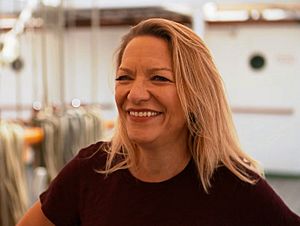Antje Boetius facts for kids
Quick facts for kids
Antje Boetius
|
|
|---|---|

Boetius in 2018
|
|
| Born | 5 March 1967 Frankfurt am Main, West Germany (now Germany)
|
| Alma mater | University of Hamburg |
| Awards |
|
| Scientific career | |
| Fields | Marine biology |
| Institutions | University of Bremen |
Antje Boetius (born March 5, 1967) is a German marine biologist. She studies the tiny living things found on the ocean floor. These small organisms are called microorganisms. She is a professor at the University of Bremen. She also leads Germany's main polar research center, the Alfred Wegener Institute.
Professor Boetius won the Gottfried Wilhelm Leibniz Prize in 2009. This award was for her important work on how seafloor microbes affect Earth's climate. She was the first to describe how some microbes can use methane without oxygen. She thinks that the earliest life on Earth might have lived this way. These microbes might even help slow down climate change in the future.
Contents
Exploring the Ocean's Depths
Antje Boetius earned her biology degree in 1992 from the University of Hamburg. Before her advanced studies, she visited the Scripps Institution of Oceanography in California. There, she was inspired by other marine scientists. She first looked at small animals in deep-sea mud. But she soon decided to study even tinier life forms: microbes.
Deep-Sea Discoveries
For her PhD, Antje Boetius wanted to study deep-sea microbes. She went on 14 expeditions to the deep parts of the oceans. She earned her PhD from the University of Bremen in 1996. Her research was about how microbes break down things in deep-sea mud.
After her PhD, she joined the Max Planck Institute for Marine Microbiology. She became a professor there in 2009. Her work focuses on how microbes in the ocean affect the carbon cycle. This is how carbon moves around Earth. She also studies how deep-sea life deals with pressure and temperature.
Protecting the Ocean
Since 2017, Professor Boetius has been the director of the Alfred Wegener Institute. This institute studies the polar regions and oceans. She also works on how we can live with the ocean in the future. She looks at topics like deep-sea mining. This is when companies try to dig up valuable minerals from the ocean floor.
Her research shows that deep-sea mining can harm ocean life. She has said that mining stops animals and microbes from returning to their homes. She believes we need to find ways to make deep-sea mining more sustainable. This could include creating protected areas in the ocean.
Awards and Recognition
Antje Boetius has received many important awards for her work. These awards show how much her research helps us understand the ocean.
- 2019 Erna Hamburger Prize
- 2019 Robert L. and Bettie P. Cody Award in Ocean Sciences
- 2018 Environment Prize (German Environment Foundation)
- 2018 Vernadsky Medal, European Geosciences Union
- 2009 Gottfried Wilhelm Leibniz Prize
Other Activities
Professor Boetius is also part of many important groups. These roles help guide science and research in Germany and beyond.
- Jacobs University Bremen, Member of the Board of Governors (since 2018)
- German Research Foundation (DFG), Member of the Senate
- Leibniz Association, Member of the Senate
- Natural History Museum, Berlin, Member of the Scientific Advisory Board
- Senckenberg Nature Research Society, Member of the Scientific Advisory Board
- American Geophysical Union (AGU), Member
- American Society for Microbiology (ASM), Member
About Her Life
Antje Boetius grew up in Frankfurt, Germany. She loved going to the seaside for vacations as a child. She also spent time in California when she was studying.
She enjoys good food, good wine, good company, music, fashion, and city life. Her grandfather, Eduard Boëtius, was a navigator on the Hindenburg zeppelin. He was one of the few crew members who survived the Lakehurst disaster.

